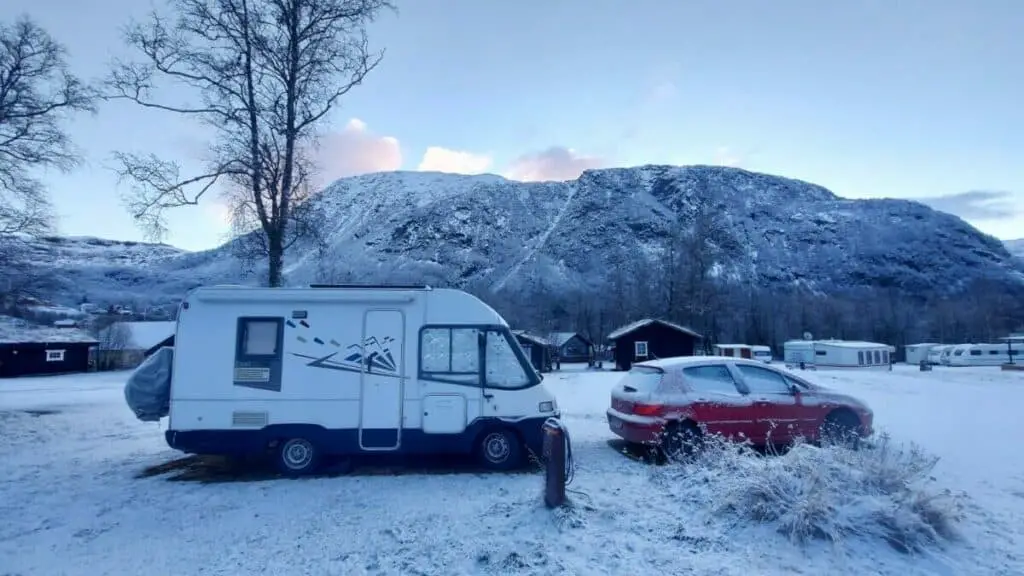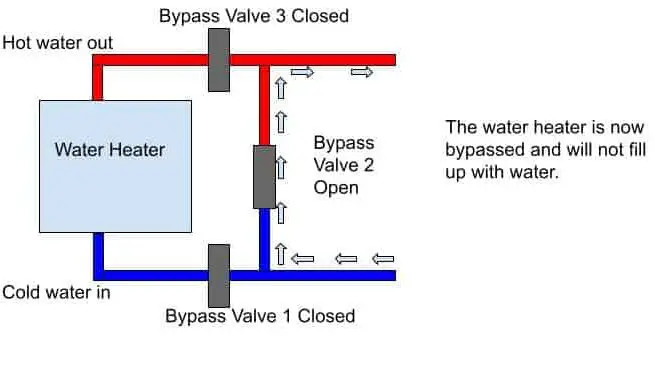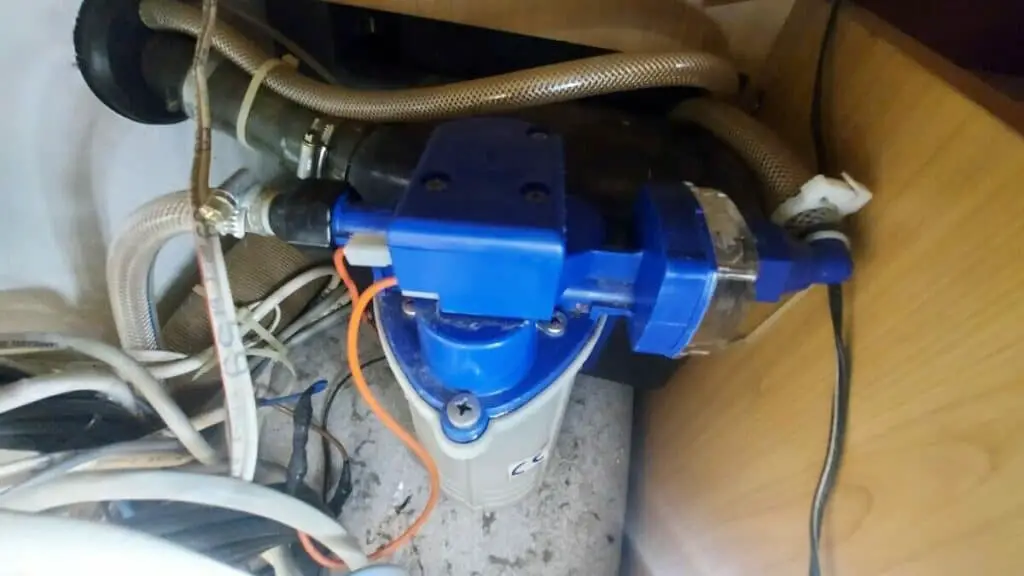This post contains affiliate links (I get a commission at no extra cost to you for purchases made through links in this post).

When the time comes to retire your RV for the off-season, antifreeze is a common part of the winterization process. As you work with the neon-colored liquid, you might wonder if it’s really needed. Can you winterize your RV without antifreeze?
You can winterize an RV without antifreeze. All you have to do is drain the system of water, and nothing in the pipes should freeze, especially if you blow the water out. Just make sure you drain your system before the weather gets close to freezing.
In Europe, omitting antifreeze when winterizing is a common practice. Everyone I know who owns a motorhome, RV, or caravan has never used antifreeze when winterizing their RVs, and maybe that’s what you’ll decide as well by the time you’re finished reading!
What Is RV Antifreeze Anyway, and What’s It Supposed to Do?
If this is your first motorhome or your first time winterizing it, then let me explain what antifreeze is and its purported benefits.
After all, it’s hard to gauge whether you really need something if you’re not sure what that something is or how it works!
RV antifreeze is a non-toxic substance you pour through your motorhome’s plumbing system.
The goal of antifreeze is to prevent frozen pipes that would be a really big headache to come back to in the springtime. Antifreeze achieves this by reducing water’s freezing point so it would take exceptionally cold temperatures for the water to freeze.
The most common RV antifreeze ingredients are propylene glycol and ethanol. You might also come across some antifreeze for motorhomes that use both.
Polypropylene glycol is the better of the two, as it’s non-flammable (which is always a good thing in my book) and can lubricate both toilet and faucet seals.
I have to make one point clear. Automobile antifreeze and RV antifreeze are not the same. You should never take the leftover jug of antifreeze you use in your car and pour it into your RV.
I know the products look the same, and maybe they’re even the same color, but automobile antifreeze is toxic while RV antifreeze is not.
Considering that RV antifreeze comes out of your plumbing lines–you know, the same ones you rely on for potable water–you don’t want any toxic substances going through there.
Can You Really Winterize an RV Without Antifreeze?
Now that you know the basics of antifreeze, is there any need to go out and purchase a big pink jug of the stuff?
As I touched on in the intro, in my experience, no! You don’t have to use antifreeze to properly winterize your motorhome.
Considering your RV water pumps can freeze, which I wrote about in this post, I know the prospect of skipping antifreeze can leave you a little nervous, but bear with me here.
I’ve owned my motorhome for many years, which means I’ve winterized it many times. I have never once used antifreeze, and my water pump, tanks, and other components of the plumbing system have never frozen.
It’s not common to use antifreeze for an RV in Europe at all. I know that in America, it is, but why? I cannot understand. I mean im from Sweden, and I can assure you that the nordic countries have darn cold winters, so that’s not the reason.
Anyway, as I said before, anyone I know who owns a motorhome or RV doesn’t use antifreeze either, so that can’t possibly be a coincidence. It’s just that you don’t need it.
I’m sure you’re wondering how you can winterize your plumbing without antifreeze in the world?
What I’ve always done is drained the system before the weather gets too cold. I’ve also heard of RVers using an air compressor to blow the water out, which is another recommended method.
Next, I’ll go into a lot more detail on how to do both methods so that whichever seems more appealing to you, you can winterize your caravan without touching a drop of antifreeze.
How to Winterize an RV Without Antifreeze: All the Methods
Are you ready to winterize your motorhome without the antifreeze? Here’s how it’s done.
Method 1 – Drain the Plumbing System
The first method I’ll describe is the one I prefer the most, and that’s draining the plumbing system of all its water.
Here are the steps to follow.
- Plan to do this before the weather gets cold. Since you’re not using antifreeze, the pipes in your motorhome’s plumbing system can freeze once the temps hit 32 degrees Fahrenheit or zero degrees Celsius.
- Empty your tanks, beginning with the blackwater tank and then the greywater tank.
- If you haven’t flushed the blackwater tank, now is as good a time as any to get that task done. Here’s how.
- You’ll need a garden hose that’s connected to an active water supply. On the other end of the hose should be a tank flush port.
- Open the blackwater tank drain valve and then empty the tank contents.
- Send water through the blackwater tank until the contents from the sewer hose are clear.
- Turn off the water but let it naturally seep from the blackwater tank.
- Detach the garden hose.
- With the tanks empty, power down your water heater, as you have to empty that as well. Ideally, you should turn off the water heater before you drain and flush the holding tanks, as the water heater will need several hours to cool down, as will the contents inside.
- Drain the water from the water heater when it is cool enough to do so, a brilliant way of using the warm water you have left is to flush it down the grey or black water tank with a cleaning product and then empty that tank again to get the tank cleaner.
- Next, empty the fresh water tank the same way you did the blackwater and greywater tanks.
- Drain the lines as well.
- Open the faucets; ensure you get all of them, including the cold and hot sides. I suggest opening the kitchen faucets first and then the bathroom faucets. Expect a little bit of water to drain out, which is normal if you’ve been in your motorhome bathroom today.
- Flush the toilets and keep doing this until the water stops dripping.
- Repeat that process with your indoor and/or outdoor showers.
- When you’re confident the lines are empty, keep the water taps open just in case there is some water left in the system, and it freezes and expands the extra pressure have somewhere to go, and nothing will break. There’s no need to plug the water heater back in, though, as you won’t need hot water for a while.
You’re all finished! But to get some extra tips and ideas on how to empty the fresh water tank the best way as well as the water heater I think you should check out the videos I made covering those topics below.
Method 2 – Blow Out the Water
The next method involves blowing out the water to be 100 percent sure the pipes are empty and cannot freeze. You can follow all the steps above through Step #7, then do this.

- You’ll need a water heater bypass valve to prevent compressed air from getting into the water heater. If it does, the heater could be damaged, and you can say goodbye to warm water in your motorhome. Bypass the water heater.
- Follow Steps #8 through #10.
- Now you can blow the water lines. Leave the blackwater and greywater tanks open, as the water that comes out will exit these tanks through your sewer hose.
- Connect an air compressor to either the city inlet port or water port. You might need a specialized adapter to attach the air compressor to the port, so make sure you have that ahead of time.
- Adjust the air compressor pressure. You only need air pressure between 30 and 50 pounds per square inch of pressure or PSI. Anything higher than 50 PSI could damage the valves and lines, which you don’t want.
- Once you’ve set the appropriate pressure, turn on the air compressor and let it run for up to 30 seconds, then turn it off.
- Have a second person go in the RV to see if water is coming out of the lines.
- Continue to use the air compressor in 30-second bursts until the other person tells you that water isn’t coming out of the shower or faucet anymore.
- Then, as you did before, close up your motorhome for the winter.
The Benefits of Winterizing an RV Without Antifreeze
If you’re still not totally convinced to set aside the antifreeze this year when you winterize your motorhome, these perks should hopefully inspire you to give it a try.
Save Money
Look, I won’t pretend that RV antifreeze is very expensive because it isn’t. It costs about as much as an automotive antifreeze, which is between $5 and $25 for a jug. Bigger jugs cost more, but not anything crazy.
Still, owning an RV is expensive! You need to heat your vehicle, pay for water and electricity (sometimes), pay to access a park or campground (again, sometimes), buy food, fuel up your motorhome, and maintain it.
If you have any opportunity to save money when it comes to your motorhome, even if it’s a teensy-weensy opportunity like skipping the antifreeze, it’s worth taking, in my opinion.
You Can Still Winterize Even Without Antifreeze Handy
Imagine this scenario.
Today is winterization day. You’ve had it planned for a while now. You have a whole checklist and what you thought was all your supplies ready.
Then, when it comes time to address your RV’s pipes, you realize you don’t have any antifreeze.
Uh-oh, guess you can’t finish wintering then, right? Wrong!
You won’t have that panicked moment again about forgetting your antifreeze if you don’t use antifreeze in the first place!
You Can Still Winterize If Your Water Pump Is Broken

If your water pump is leaking like I wrote about here or if it’s failing in any other way, you can’t use antifreeze.
You need the pump to send the pink liquid through your plumbing system. Without it, you can’t be sure the antifreeze got all the way through the pipes.
I wouldn’t recommend sitting on water pump issues for long, as it’s not like they’re going to get better unless and until you address them.
I’m just saying that in a situation such as this, it’s no antifreeze, no problem.
No Worries About Chemicals
RV antifreeze isn’t toxic–which is what sets it apart from automotive antifreeze–and the polypropylene glycol antifreeze is less toxic still.
At the end of the day though, antifreeze is a chemical, and it’s a chemical that can come out of your tap after flushing your plumbing system with it.
There could be a bit of a flavor residue, so to speak, that can linger for a while.
I don’t know about you, but that sounds mighty unpleasant. I would worry about what that could do to my health as well as the health of your children (if you have any).
Oh, and I must tell you that the non-toxicity of RV antifreeze only extends to humankind, not animals.
Polypropylene glycol, according to the Pet Poison Helpline, is only a mild poison, but it’s a poison, nonetheless.
Cats are more likely to experience adverse effects to RV antifreeze than dogs, but it’s not good for either pet, especially if consumed in large amounts.
It smells sweet, and that can inspire your pets to try and cop a taste. Once your pet begins licking the antifreeze, they’ll realize it tastes sweet too. Then you have a big problem.
Traveling with pets is fun until you have a health emergency and you’re thousands of miles from home. You’d have to entrust your pet’s life to a vet you’ve never met.
Is it worth it when you can winterize your RV without the antifreeze? I don’t think it is.
Conclusion
Winterizing your RV without antifreeze might seem unthinkable to some, but it’s what I’ve done the entire time I’ve owned an RV, which has been many years.
In all that time, my plumbing lines have never frozen because I drain my water system thoroughly before I close everything up for the winter.
Skipping the antifreeze is much more convenient. I can travel freely with my pets and family without worrying about drinking antifreeze-laced water, which is the most significant benefit of all!

I agree with your point of view, your article has given me a lot of help and benefited me a lot. Thanks. Hope you continue to write such excellent articles.